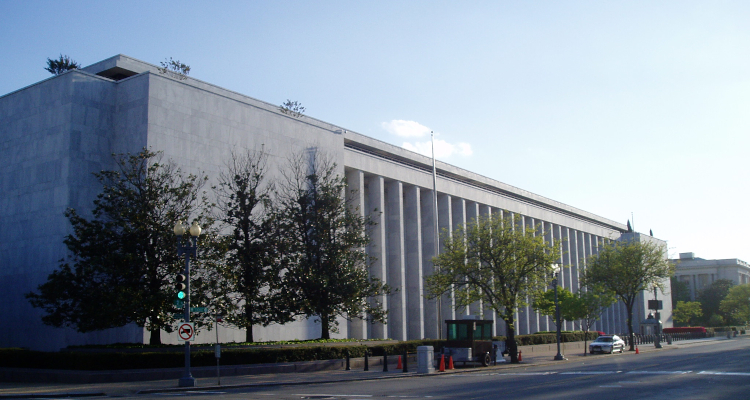Washington, D.C.’s James Madison Memorial Building, which houses the U.S. Copyright Office.
After increasing webcasting royalty rates for the 2021-2025 period, the Copyright Royalty Board (CRB) has officially announced a cost-of-living adjustment for 2023 – prompting songwriter organizations to call for a similar provision in the Phonorecords IV proceeding.
The three-judge Copyright Royalty Board just recently released its final order detailing the 2023 cost-of-living adjustment for webcasters, having unveiled the initially mentioned heightened rates for 2021-2025 in June of last year.
Under the latter, commercial webcasters will until 2025’s end pay a baseline $0.0026 per performance for subscription services and $0.0021 per performance for non-subscription services. Meanwhile, non-commercial webcasters will cough up “$1000 per year for each channel or station and $0.0021 per Performance for all digital audio transmissions in excess of 159,140 ATH [aggregate tuning hours] in a month on a channel or station,” the CRB relayed in the summer of 2021.
But the judges also made clear that the rate would be subject to an annual cost-of-living adjustment, and now, said adjustment has bumped the 2023 commercial-webcaster rate to $0.0030 for each subscription performance and $0.0024 for each non-subscription performance.
Additionally, the adjustment, which factors for changes in the Consumer Price Index for All Urban Consumers (CPI-U), will see non-commercial webcasters pay “a 2023 rate of $0.0024 per performance for all digital audio transmissions in excess of 159,140 ATH in a month on a channel or station.”
As initially mentioned, the Songwriters Guild of America (SGA), Music Creators North America (MCNA), the Society of Composers & Lyricists (SCL), and others are now drawing attention to the absence of a cost-of-living adjustment that extends to on-demand streaming in Phonorecords IV.
These organizations reached out to Digital Music News today with word of the comments and concerns that they had forwarded to the CRB as part of the highly controversial Phonorecords IV proceeding, a proposed settlement for which would set the royalty rates for on-demand streaming platforms like Spotify from 2023 until 2027.
“The ‘privately negotiated’ settlement proposal –which provides for a microscopic, phased-in rise in streaming rates of 1.66 percent in the aggregate over a five-year period– in fact represents ‘growth’ so far below the current, near double-digit rate of inflation that by 2027, its adoption might effectively result in a streaming royalty rate in adjusted dollars that falls below the rates in effect prior to the 2018-2022 Phonorecord III adjustment,” the organizations’ firmly worded position reads.
From there, the close to 20-page-long document explores in detail the history of recent rate negotiations (including a May pact, concerning physical and downloads, that came to fruition after the CRB rejected a proposed rate freeze) and the conflict of interest between the National Music Publishers’ Association and the majors. The latter own massive publishing companies (which have multiple members on the NMPA board) and, for several reasons, stand to earn far less money from compositions than through recordings.
“Even in light of the significant rate increases approved under Phonorecord III, we were and remain left to wonder how NMPA and NSAI [Nashville Songwriters Association International] could possibly have agreed to a deal that limited increases in streaming rates over the next five years under Phonorecord IV to about one third of one percent per year on average, when US inflation is now running close to double digits, if not higher, and expected to so continue,” the SGA and others proceeded.
“Specifically, with inflation limited to even 7.5 percent per annum over the next five years, the value of US dollars would be reduced by approximately 50 percent by the end of 2027, while streaming revenue percentages will have risen just 1.66 percent in total,” the text continues. “This phenomenon might reset the revenue values of streaming back to Phonorecord II levels, representing a total give-back of gains achieved over the past decade.”
Bearing in mind these concerns, the filing parties have asked the CRB to perform another “thorough inquiry,” including an analysis of “whether a COLA provision is warranted, just as it has been included in several other recently negotiated rate agreements approved by the CRB.”

